How To Get Enough Protein As A Vegan
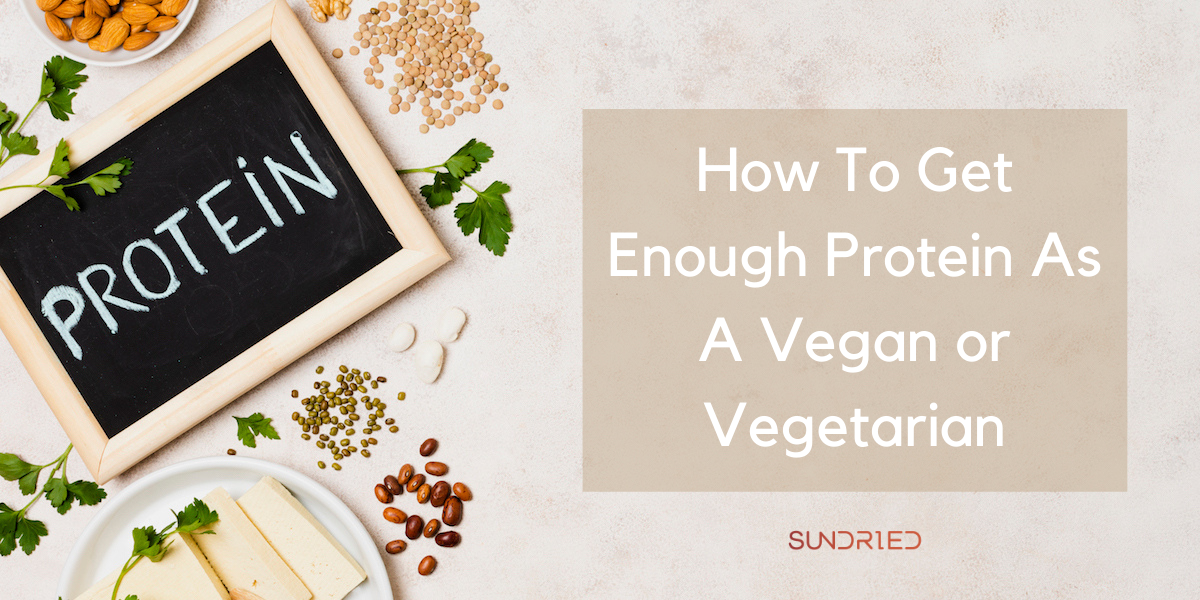
One of the big issues for highly active vegans and vegetarians is how to get enough protein. The recommended daily intake of protein is 45g per day for women and 56g for men, with this rising to 1.2-1.7g per kg of bodyweight with increasing physical activity.
Protein is vital for repairing and building muscle. Exercise breaks down muscles to provide energy for your activity, so the more intense your exercise, the more protein you need to repair those muscles and make them stronger. Animal sources generally provide a greater amount of protein per gram than plant sources, and many vegetarians will be tired of the question “how do you get enough protein?” The answer is that meat-free alternatives have become more readily available, and more interesting, which means we no longer have to guzzle down the protein shakes.
What is protein?
Protein is made up of amino acids. Some are produced naturally by our bodies, but nine can only be obtained through our diet. These are known as the “essential” amino acids. They nine essential amino acids are:
- Lysine
- Histidine
- Isoleucine
- Phenylalanine
- Threonine
- Tryptophan
- Valine
- Leucine
- Methionine
Many animal products contain all essential amino acids and are considered “complete” proteins, however, most plant products do not. Therefore, an athlete who does not eat meat products will have to look elsewhere for effective protein sources.
Mycoprotein and soy
Mycoprotein is a protein derived from fungus and is a common meat substitute marketed under the brand name Quorn. It’s a popular meat alternative as it’s sold in forms that replicate common meat products, such as burgers, sausages, and even chicken nuggets. Soy proteins are used by other brands in a similar way and are often a cheaper alternative to Quorn. These are great options, as they slot easily into the meat-shaped hole we expect in a meal, especially if you are transitioning to a meat-free diet or live in a household with people who are more resistant to eating plant-based meals.
Mycoprotein and soy are rich sources of all nine essential amino acids while being low in sodium, sugar, and fat, and their low calorific value has also made them popular amongst those looking to lower their calorie intake.
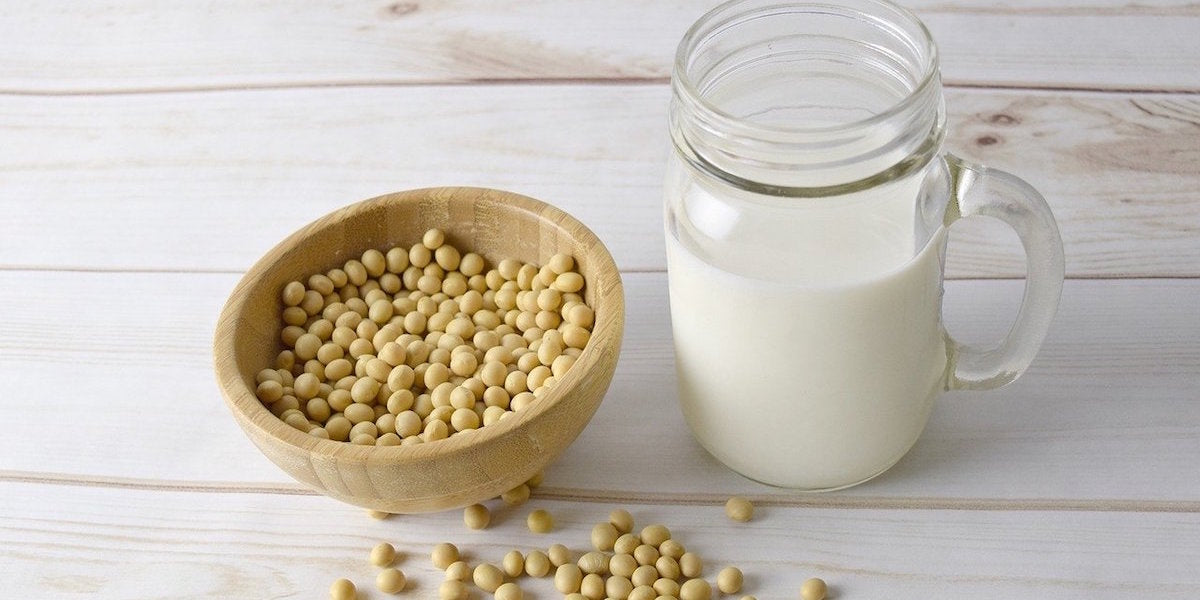
Seitan, tofu, and tempeh
Tofu is probably the most recognisable vegan alternative, and while seitan and tempeh may be less familiar, they are all fantastic and versatile sources of protein. You can find these in in the world-food aisle of most large supermarkets and specialty delis. They can be canned, jarred, or boxed, which makes them great for storage. Pro-tip: they can often be found much cheaper in oriental supermarkets if you are lucky enough to have one nearby. They have little flavour of their own, which may be off-putting at first, but it means that they absorb the flavour of a dish, so are perfect for a curry or chilli.
Tofu is made from soybean curds, and is rich in iron and calcium, which are vital minerals, especially for highly active people, making tofu a great all-round food. It can be silken, soft, firm, or extra firm, and it’s important to get the right one for your needs. Firm tofu is best for a scramble (a vegan alternative to scrambled eggs), whereas silken tofu can replace heavy cream in dessert recipes when pureed. Like tofu, tempeh is made from soybeans, so has a similar nutritional profile. However, it’s firmer than tofu, which makes it more suitable to stir fries, or even sandwiches.
Seitan is surprisingly easy to make at home. Formed from gluten flour, it can be shaped into pretty much anything, including bacon, steaks, or kebabs. It’s denser and chewier than tofu, so can replicate that meaty texture we may expect to find in a meal. It also contains a whopping 75g of protein per 100g, while being extremely low in fat. One issue that many athletes encounter when trying to up their protein intake is that many protein sources come with a high fat content. This can lead to inadvertent weight gain, so low-calorie protein sources are ideal for all athletes.
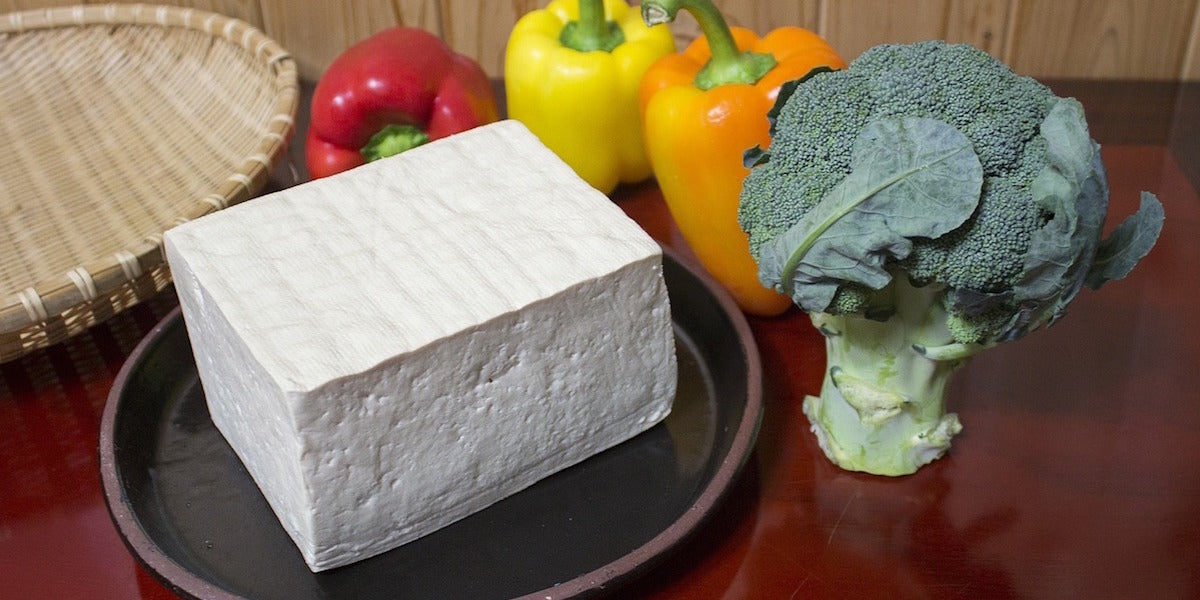
Beans and legumes
Beans and legumes are the traditional staples of a meat-free diet. Low in fat, easy to find and adaptable, beans and legumes should be a staple in every athlete’s cupboard. Soybeans, lentils, split peas, pinto beans, and kidney beans have the most protein, but even baked beans have 9.7g per half can. Beans also count as one of your five a day, and are high in fibre and low in fat, so you never have to feel guilty about that post-swim beans on toast. Adding extra beans to soups or stews is a quick way to boost the nutritional profile and will also help keep you fuelled for longer.
Chickpeas and lentils are some of the best foods to be throwing in your shopping basket. They work well in many dishes that would traditionally contain meat, such as bolognese or shepherd’s pie, and are some of the cheapest products per gram of protein, freeing up cash for new leggings or another race entry.
A seriously underrated legume is edamame. 100g contains 11g of protein, along with a good amount of fibre, calcium, iron, and vitamin C. Throw half a cup of edamame beans on top of rice bowls or as a side with your usual greens for a sneaky few extra grams of protein.
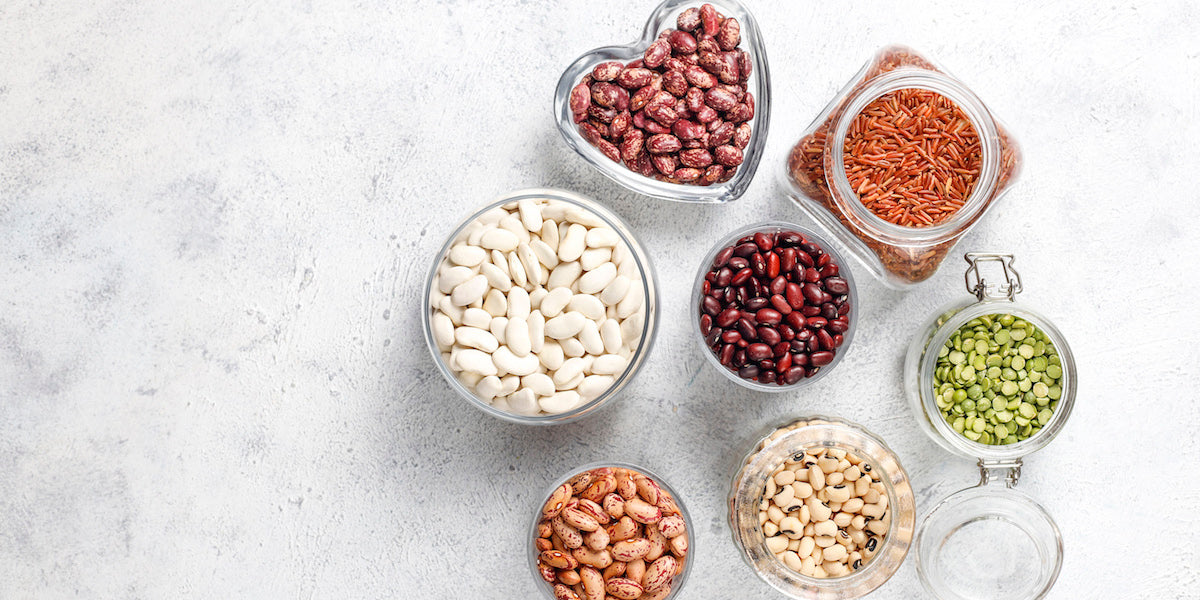
Grains, nuts, and seeds
Carbohydrates usually make up a significant portion of every meal, so it makes sense to chose ones with bonus protein. Unrefined grains are best, so look for quinoa, whole wheat pasta, wild rice, couscous, buckwheat, and oatmeal. Replace egg noodles with a soba version, try a risotto with spelt, or add bulgur to a salad.
Ezekiel bread is a powerhouse made from sprouted whole grains and legumes, including barley, soybeans, wheat, lentils, millet, and spelt which means it provides all nine essential amino acids and 10.3g of protein per 100g. It can be tricky to locate in your local supermarket, but can be found in many health food stores. Even regular white bread contains a surprising 9g of protein per 100g, but it lacks the nutritional extras, so if Ezekiel bread doesn’t sound appealing opt for multigrain which has a massive 4.7g per slice.
Nuts and seeds are also a well-known protein source, but they should be eaten in moderation as they are often high in fat. Peanuts, almonds, and pistachios are some of the better choices, as are pumpkin, hemp and chia seeds. Creating your own trail mix from your favourite nuts and seeds with some dried fruit and cacao nibs is a much healthier snack that’s ideal fuel for long bike rides.
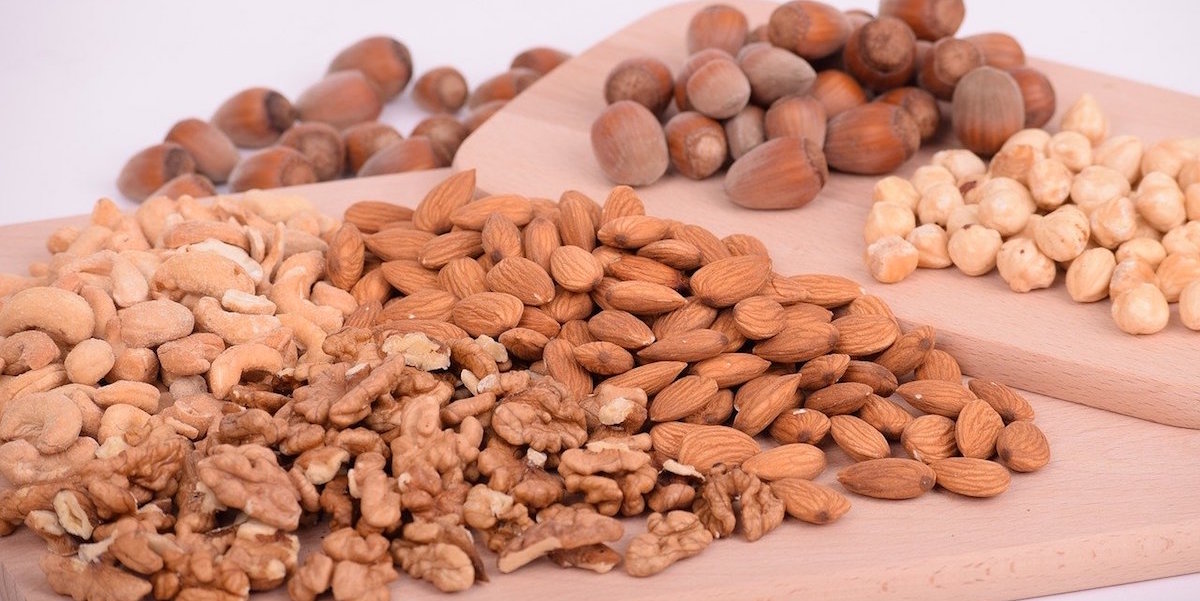
Nutritional yeast
Nutritional yeast is a deactivated strain of Saccharomyces cerevisiae (a species of yeast) grown as a food product. It is sold as a powder or flakes, and it popular for its distinctive umami flavour that can be used to add a cheese-like flavour in dishes like pasta. Just 15g provides 8g of protein, so add it to sauces or soups for extra B vitamins, zinc, magnesium, copper, manganese, all of which are crucial for athletes as they increase haemoglobin (to carry oxygen around the body), help turn food into energy, and heal wounds. While it can be found in most supermarkets, it’s often cheaper from health food shops and online.
Protein consumption
The timing of protein consumption is important for anyone undertaking physical activity. It’s advisable that protein is included with every meal, and after any exercise. The anabolic window is the 30 minutes after exercise where protein consumption will optimise muscle repair and growth. You want to aim for 20-30g during this period, so this is a great time for that trail mix, or try a tempeh sandwich on seeded bread, a homemade butter bean dip with pita and vegetables or a bowl of granola with a glass of milk.
It’s also advisable to have multiple protein sources in a meal. Since most plant-based protein sources lack all the required amino acids, combining them can cover a greater range. For example, grains like rice are too low in lysine to be considered complete, so by eating them with lentils or beans, which are higher in lysine you can obtain all nine essential amino acids. Consider building a protein bowl by choosing a grain, a variety of vegetables, a form of tofu/tempeh/seitan, and a sauce. For example, faro + asparagus + peas + grilled tofu + lemon mustard dressing, or wild rice + broccoli + edamame + seitan + soy sauce.
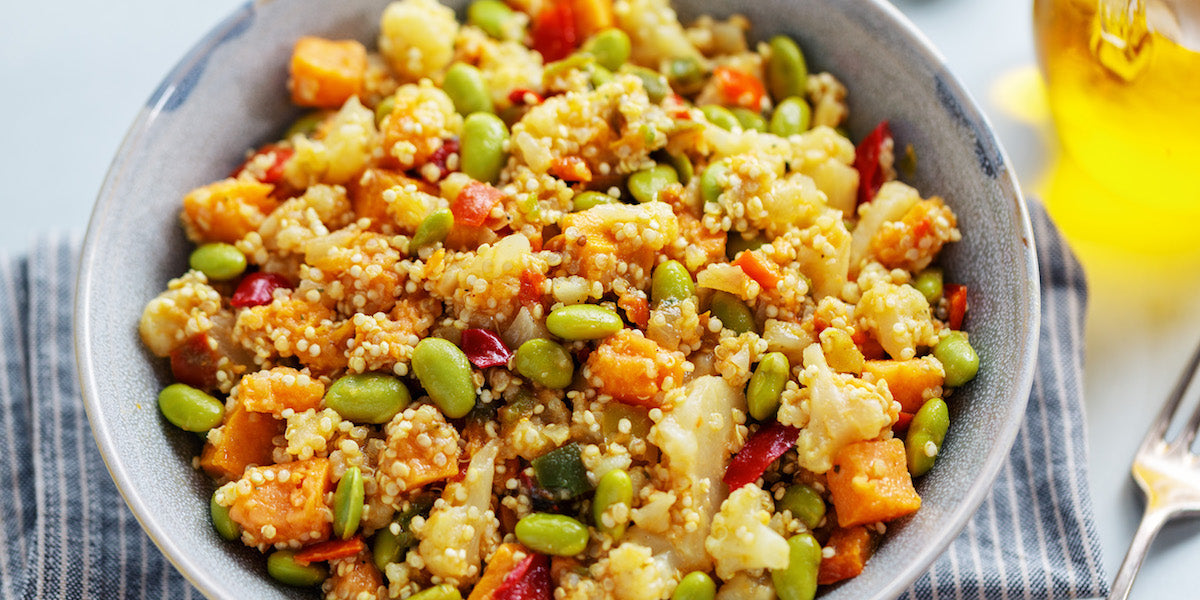
Consuming protein in every meal makes it much easier to reach that higher protein goal. In many ways, plant-based protein can be simpler to achieve as you’re not tying yourself down to the idea of a meat-and-two-veg meal. It also encourages a more diverse diet, which increases the spectrum of vitamins and minerals consumed. A plant-based diet does not have to be restrictive; it can be an opportunity for an all-round healthier lifestyle.
About the author: Kim Graves is a nutritional advisor, writer, and editor. Having spent a decade working in publishing, Kim is using those skills to share her love of food and wellness. Kim is also a keen triathlete and weightlifter, constantly finding new physical activities to try and challenges to take part in. She writes about great women at www.forcemujer.co.uk and nutrition at www.thefitchen.co.uk. You can follow on Instagram @kim_grs or find some recipe inspiration and ask nutrition questions over at @thefitchen.

